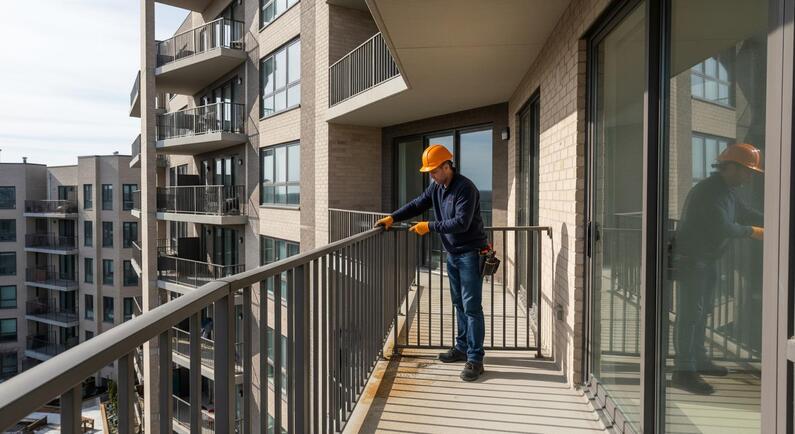When managing a Homeowners Association (HOA), condominium complex, or apartment building, one of your top priorities is maintaining safety, compliance, and the overall structural integrity of the property. Particularly in California, HOA deck inspections and multi-unit deck compliance inspections are mandated by state laws SB-326 and SB-721. Understanding these requirements, their implications, and the inspection process itself can save you from significant liabilities and financial burdens.
West Coast Deck Inspections, specializing in HOA & Multi-Unit Deck Compliance Inspections, provides detailed, thorough evaluations to ensure you meet and exceed California’s rigorous safety standards. Serving communities across the West Coast, they are dedicated to protecting property values, reducing risks, and maintaining compliance.
Understanding SB-721 and SB-326
California’s deck safety laws, SB-721 and SB-326, were introduced to safeguard the public following tragic incidents involving deck collapses. Though similar, these laws have distinct requirements tailored to different property types.
SB-721: Apartment Buildings (Non-HOA)
SB-721 applies specifically to apartment buildings with three or more units. This legislation mandates regular deck, balcony, and elevated walkway inspections to identify safety hazards proactively. Apartment building deck compliance under SB-721 inspection requirements is critical for property owners and managers to avoid liabilities, fines, and potential lawsuits.
SB-326: HOA Communities (Condos, Townhomes)
SB-326, often called the “balcony inspection law,” specifically targets HOA-managed properties, including condominiums and townhomes. This regulation demands periodic balcony and deck safety inspections to protect HOA communities. HOA deck inspections conducted under SB-326 are mandatory and must be performed by qualified professionals every nine years.

What Do Compliance Inspections Include?
HOA and multi-unit deck compliance inspections under SB-721 and SB-326 are comprehensive, involving detailed assessments of structural components, waterproofing systems, and overall safety.
Visual and physical inspection of:
- Decking, joists, beams, railings, and connections
Inspectors examine the deck’s structural integrity, checking for deterioration or improper installations. - Water damage, dry rot, insect infestation, and corrosion
Hidden issues like rot, mold, or insect damage can significantly weaken structures over time. - Ledger boards and attachments to buildings
The ledger board attachment is critical for deck stability; inspectors closely examine for proper installation and weatherproofing.
Moisture intrusion and waterproofing checks
Inspectors use advanced moisture detection techniques, including borescopes and moisture meters, to identify areas vulnerable to water intrusion, a leading cause of structural damage.
Evaluation of life expectancy and load-bearing capacity
Inspectors determine the remaining lifespan of deck components and assess their ability to support intended loads safely.
Photo documentation and written report with recommendations
All inspection findings are clearly documented, including photographs, with comprehensive recommendations for repairs, maintenance, and future compliance needs.
Why Compliance Inspections Are Critical for HOAs
Compliance inspections aren’t merely legal obligations—they’re strategic moves that protect HOAs and their residents.
Legal requirement under California building code
Failure to conduct regular inspections violates California law and exposes your community to legal risks.
Prevents accidents, injuries, and potential lawsuits
Routine inspections significantly reduce the risk of structural failure and accidents, thereby protecting your community from costly liabilities.
Maintains property value and ensures insurance eligibility
Compliance inspections safeguard property values and ensure continued eligibility for affordable insurance coverage, preventing premium hikes or policy cancellations.
Helps in budgeting future repairs and reserve funding
Detailed inspection reports provide valuable information to accurately budget for repairs, allowing better management of reserve funds.
Required for real estate transactions and disclosures
HOAs must disclose deck conditions during property transactions; compliance inspections simplify this process, enhancing transparency and reducing transaction complications.

Choosing the Right Inspection Firm
Selecting the right inspection firm for HOA & Multi-Unit Deck Compliance Inspections is crucial to ensure thorough evaluations and avoid conflicts of interest.
Ensure proper credentials for SB-721 or SB-326
Inspectors must have specific training and certification in California’s deck inspection laws.
Ask about inspection methods
Inquire whether inspections involve invasive testing, load testing, or the use of technology like borescopes, ensuring the thoroughness of the inspection.
Look for firms with HOA and multi-unit experience
Companies experienced in multi-unit deck compliance understand the unique challenges and regulations HOAs face, providing more accurate and actionable reports.
Request sample reports and check online reviews
Assess previous inspection reports and reviews to gauge quality, clarity, and customer satisfaction.
Confirm the firm does not also bid on repairs
Hiring an independent inspector who doesn’t bid on repairs avoids potential conflicts of interest, ensuring objective recommendations.
West Coast Deck Inspections meets all these criteria, providing specialized HOA and multi-unit deck compliance inspections across the West Coast. Their independence ensures unbiased, professional recommendations.
What Happens If You Don’t Comply?
Ignoring compliance inspection requirements can lead to serious repercussions, affecting both financial stability and safety.
- Possible fines and code violations: Non-compliance results in hefty fines, daily penalties, and even mandatory court orders for compliance.
- HOA liability for accidents or structural failure: Without proper inspections, HOAs can face lawsuits and be held financially accountable for injuries or structural damage.
- Loss of insurance coverage or increase in premiums: Insurance companies may refuse coverage or drastically raise premiums if decks aren’t inspected and certified regularly.
Risk of lawsuits from residents or buyers: Residents or potential buyers may take legal action due to undisclosed structural issues, leading to costly legal battles.
Secure Your HOA’s Future with West Coast Deck Inspections
Choosing West Coast Deck Inspections ensures you get detailed, accurate, and reliable HOA and multi-unit deck compliance inspections tailored specifically for SB-721 and SB-326 requirements. With extensive experience, comprehensive inspection methods, and a commitment to independence, West Coast Deck Inspections stands apart as a trusted partner for communities throughout California.
Don’t risk your community’s safety or financial security—schedule your HOA & Multi-Unit Deck Compliance Inspection with West Coast Deck Inspections today. Our experts proudly serve West Coast communities, specializing in deck and balcony inspections to keep your residents safe, your property compliant, and your investments protected.To learn more, visit our dedicated page on HOA & Multi-Unit Deck Compliance Inspections or contact our team directly for personalized guidance.
